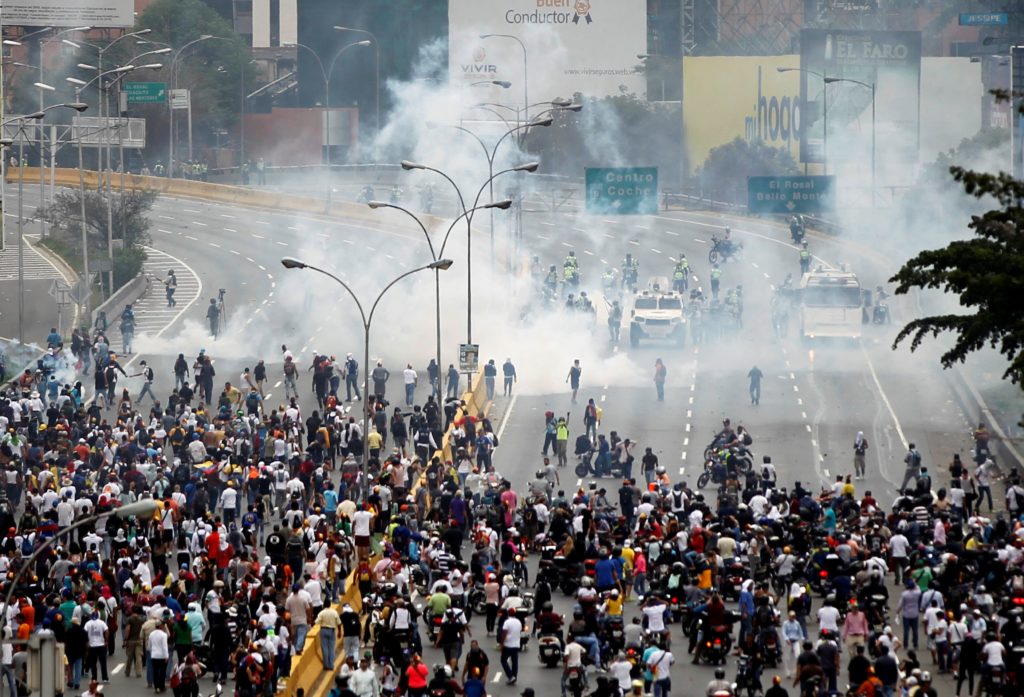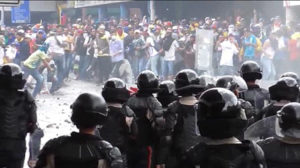


Maduro upped the ante July 30 2017
I posted a piece on the Constituent Assembly Elections today from where I am in El Salvador. Tomorrow I’ll be heading into the World Poetry Festival of El Salvador, dedicated to Oscar Romero so I’ll no doubt be occupied for that for the better part of a week.
This piece that follows is a translation I did of an excellent piece on the Bolivarian “Revolution” of Venezuela, written by ex-guerrilla commander of the Salvadoran People’s Revolutionary Army (EPR). I tried to get this published at left websites, but to no avail. The left, in general, it seems, still doesn’t want to hear any bad news about Venezuela.
[Update: I am told by someone I respect deeply who was very much involved in the Salvadoran solidarity movement that Villalobos was linked to the murder of the great Salvadoran poet Roque Dalton, and that he “worked as a consultant for the State Dept and the UN on counterterrorism.” Thanks for the info. My Salvadoran friend here, who was in the FPL and a political prisoner in the 1980s for her political work, tells me Villalobos has quite good analysis on some things. So messengers are often tainted, but still, the message here is what’s important, and I think Villalobos, who clearly has moved to the center, is spot on as regards Venezuela.]What’s Left of Venezuela
By Joaquin Villalobos
The Maduro regime is becoming the grave of the “Bolivarian Revolution.” Confronting a coalition of centrist forces that believe in democracy and the market, it’s a dead model and nothing can revive it.
In Latin America there are three transitions beating the extreme Left: the end of the armed struggle in Colombia; the gradual, but irreversable, return of Cuba to capitalism; and the end of the Bolivarian Revolution. Venezuela is the axis of these three transitions. With more than 400 political prisoners and a refusal of alternation in power through free elections, the Chavista regime has turned out to be a dictatorship. After the Fujimori attempt, extreme right-wing dictatorships came to an end on the continent and after nearly forty years of democracy only the extreme Left dictatorships of Cuba and Venezuela are left. In this context the 100 days of protest against Maduro have become the longest peaceful rebellion with the greatest participation in the history of Latin America. No other previous dictatorship has confronted such a powerful force of rejection.
If Nicolás Maduro had accepted the referendum on his presidency in 2016, he might have lost preserving 40% of the vote. But now each day that passes his support is less, so Maduro has now become the grave-digger of the Bolivarian Revolution. It’s completely false that in Venezuela there’s a struggle between a revolutionary left and a fascist right; the Venezuelan regime is facing off against a coalition of forces that is essentially centrist and includes political parties, leaders, social organizations, and left-wing intellectuals who believe in democracy and the market. What’s at stake in Venezuela is the future of political centrism in Latin America because, at this point the democratic forces aren’t fellow travelers with extremists of the right or the left. The defeat of extremism opens the possibility of reaching a greater democratic maturity on the continent.
Chávez could offer a few more years of life to the Cuban regime which is now, literally, trying to move away from the Venezuelan oil tit to grab hold of the North American financial tit. Even 18 years ago it was intellectually obvious that the Bolivarian Revolution had an expiration date. The history of the busts and booms in the price of oil and technological advances showed the absurdity of expecting eternity from a petro-socialism that allowed redistribution without production. Nevertheless, leftists of all Latin America, Spain, France, Great Britain, the United States and the rest of the world saw in Hugo Chávez the resurrection of the Messiah and in Venezuela the rebirth of the utopia that died in Eastern Europe and agonized in Cuba. The euphoria was such that, for many, to be on the Left implied applauding Chávez and not criticizing Fidel Castro. The Venezuelan checkbook bought loyalty on a universal scale. Undoubtedly the end of the regime leave behind losers everywhere, and so it continues to maintain its defenders and maintain their silence.
But finally, as was quite predictable, the socialism of the 21st century imploded and the humanitarian crisis is enormous. The revolutionary spending spree and robbery has come to an end. The Chavista model has leaped from social inclusion to the exponential multiplication of misery. The model is dead and absolutely nothing can save it. The Chávez regime was the only one of the so-called Bolivarians who declared open war on the market with expropriartions that brought an end to the Venezuelan economy. Now all that’s left is the brute force of the military character it always had. The ideas that Chávez adopted were more an opportunity for the militant Venezuelan tradition than an ideological definition. The main element for cohesion in the Bolivarian Revolution was never ideological, but monetary. With the dollar bills from oil income it was easy for a group of military men to decide, out of their own self-interest, to proclaim themselves leftists.
The Venezuelan military has more generals than the United States, and they occupy thousands of government posts; they’ve armed the paramilitaries; they’re involved in drug trafficking; they’ve moved in and expropriated businesses; they reap the benefits of corruption; they control the black market; they repress, imprison, torture and judge opponents. En 17 years the military has killed nearly 300 Venezuelas for protesting in the streets. In the whole history of Latin American dictatorships there has been no other military elite that has been able to enrich itself as has the Venezuelan, and all this has been defended as a “popular revolution” by the extreme Left all over the world. The wealth of Venezuela has succeeded in making the First and Third World intellectuals see the formerly “right-wing gorillas” as a revolutionary phenomenon.
Formerly Latin American revolutionaries were persecuted by the United States. The Bolivarians, on the contrary, have property and bank accounts in Florida. There’s no need to invade Venezuela as the US tried to do in Cuba, nor to arm “contras” as was done in Nicaragua. The “Bolivarian Revolution” doesn’t depend on Russia or China, but rather on its enemy, “Yankee imperialism,” who continues to buy its oil. Venezuela only supplies 8% of the US market. Suspending this purchase wouldn’t affect the United States, nor would it be an “agression” but rather a market-based decision. And so, as extraordinary as it might seem, Maduro continues governing thanks to Donald Trump. There’s no worthy anti-imperialist argument since the United States hasn’t intervened in Venezuela as it did in Chile, Dominican Republic, Panama or El Salvador.
The great progress in welfare reached by the Center-Left in Costa Rica, Chile, Spain, not to mention Sweden, Norway or Denmark, came through respecting democracy and the market, by contrast with the social and economic disaster of Cuba and Venezuela. The stubborness of the utopians wanting to make possible the impossible is incomprehensible. Chávez didn’t invent a new socialism for the 21st century but rather went down the same wrong road by fighting the forces of the market, and now his heirs are doing the same against democracy.
The Marxist assumption was that the “Bolivarian Revolution” would reach the development of productive forces but, like Cuba, it only succeeded in destroying them. The Bolivarians oversaw the deterioration in oil production and squandered the greatest oil windfall Venezuela has ever seen. They have not only crossed swords with Karl Marx. In Venezuela the rulers have found it impossible to govern; there’s an extreme increase of misery among the people and an extraordinary intensification of popular struggle. These are the three conditions that Vladimir Lenin established for the recognition of a revolutionary situation. How sad it must be to buy yourself a revolution of lies and be defeated by one of truth. As Rubén Blades says in his song, “Life gives you surprises, life gives you surprises.”
Joaquín Villalobos is a former military commander of the Revolutionary People’s Army (ERP), one of the five guerrilla armies that made up the Farabundo Marti National Liberation Front (FMLN), now reformed as the ruling political party of El Salvador. Villalobos moved from the far left to the center and eventually left the FMLN in 1995. He now teaches and lectures on security issues and conflict resolution.
Translation by Clifton Ross. The original article was published in El País.